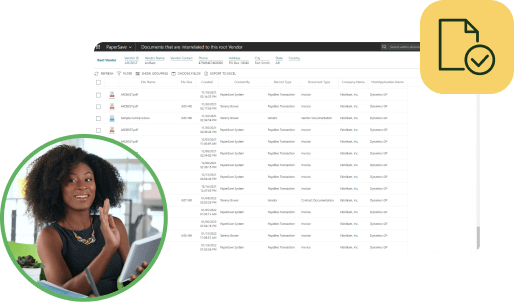Every organization needs a robust data-governance strategy for managing essential corporate information and taking the steps necessary to ensure that it stays secure and compliant with industry regulations. Documents and records are two things that form the lifeblood of the modern workplace, but it’s often easy to confuse the two.
Many businesses manage their documents and records separately, which can lead to confusion since there’s a huge overlap between the two.
In other words, a document might also be a record, but that doesn’t mean all documents are records. Therefore, it’s important to understand the difference, especially because records are more likely to be subject to compliance regulations and require additional security.
With that in mind, let’s look at the key differences.
Documents, records, and compliance
As far as the law is concerned, a record is an item, whether in digital or printed form, that refers to a completed action, such as a transaction or signed contract.
The term “document” is typically broader. It refers to items that have not yet been finalized, such as unsigned contracts, emails, and other communications between employees and customers. As such, they might be considered part of a business workflow in progress.
That said, a document can, of course, also contain confidential information, such as PHI (patient health information), in which case it will also be subject to compliance rules.
Although they’re more likely to contain sensitive information than regular documents, records must be kept on file and unmodified for the sake of compliance and security. For example, an invoice refers to a final transaction that you’ll need to retain without any modification for things like tax returns and other financials.
To that end, record management refers to the preservation of a record, along with a predefined lifecycle. By contrast, documents may be edited without restrictions, and that’s why document management systems (DMS) place a major emphasis on searchability, quick retrieval, and collaboration capabilities.
Bringing your business data together
Every business, at least those that are compliant with industry standards, already have some form of record management in place. After all, unalterable records form a crucial part of many business processes.
Documents also play an important role in organizations of all types, and that’s why many business leaders are considering expanding their existing record-management processes to also incorporate document management.
In other words, they want to achieve their goal of consolidating all business data into a single, centralized system that provides easy control over everything.
The ability to efficiently manage both your documents and records is crucial to the success and compliance of your business. While document management helps streamline and automate workflows, records management is a lot more black and white in that it’s largely about matters of compliance.
That’s why many modern document management systems take into consideration the entire document lifecycle right up to when they become permanent records.
Another important consideration often overlooked when migrating to document management systems is the ability to capture, store, and manage printed documents. While many businesses are going paperless, at least for most day-to-day operations, it’s still necessary to handle hard copies on occasion.
That’s why companies also need the ability to scan and convert documents into editable text and file printed records within one integrated platform.
PairSoft provides an all-in-one document management solution that integrates with Microsoft Dynamics, Blackbaud, and Intacct to provide a centrally managed repository of all your corporate documents and records.







